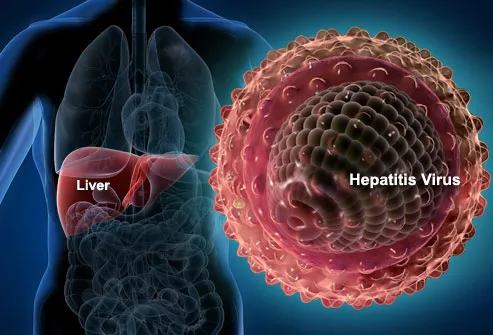
Hepatitis is an inflammation of the liver. The condition can
be self-limiting or can progress to fibrosis (scarring), cirrhosis or liver
cancer. Hepatitis viruses are the most common cause of hepatitis in the world
but other infections, toxic substances (e.g. alcohol, certain drugs), and
autoimmune diseases can also cause hepatitis.
There are 5 main hepatitis viruses, referred to as types A,
B, C, D and E. These 5 types are of greatest concern because of the burden of
illness and death they cause and the potential for outbreaks and epidemic
spread. In particular, types B and C lead to chronic disease in hundreds of
millions of people and, together, are the most common cause of liver cirrhosis
and cancer.
Here are the frequently asked Questions about Hepatitis
Q: How can
one get Hepatitis?
A: Just like hepatitis B, you can get this type by sharing
needles and having contact with infected blood. You can also catch it by having sex with somebody who's
infected, but that's less common. The blood used in transfusions is safe.
Q: What are the causes of Hepatitis?
A: The hepatitis A virus,
which causes the infection, usually is spread when a person ingests even tiny
amounts of contaminated fecal matter. The hepatitis A virus infectsliver cells
and causes inflammation. The inflammation can impair liver function
and cause other signs and symptoms of hepatitis A.
Q:Can Hepatitis
be cured or treated?
A: The Hepatitis C virus is considered “cured”
if the virus is not detected in your blood when measured with a blood test 3
months after treatment is completed. This is called a sustained virologic
response (SVR) and data suggest that you will stay virus free indefinitely.
Q:How do
you spread Hepatitis?
A: The Hepatitis C virus is considered “cured”
if the virus is not detected in your blood when measured with a blood test 3
months after treatment is completed. This is called a sustained virologic
response (SVR) and data suggest that you will stay virus free indefinitely.
Q:How
contagious is Hepatitis?
A: Infectious causes of hepatitis usually are, but not always, contagious. For example,hepatitis caused by viruses usually is contagious although many types are transferred
mainly from person to person by blood to blood transfer (individual sharing
needles, acupuncture, sexual contact, and organ transplantation).
Q:Can Hepatitis be gotten through kissing?A: Hepatitis B is not spread through sneezing, coughing, hugging, or
breastfeeding. Although the virus can be found in saliva, it is not believed to
be spread through kissing or sharing utensils. Yes. ... In
addition, the vaccine is recommended for anyone who has never been infected and
is at risk for getting Hepatitis
B.
Q: What can cause liver disease?
A: Causes of elevated levels of bilirubin in the blood can
be caused by infections, viral hepatitis, anemia, genetic diseases, and liver
problems. Symptoms of elevated
bilirubin levels depend on the cause; however, jaundice is a common sign.
Treatment for elevated bilirubin levels depend on the cause.
Q: What are the causes of Hepatitis B?
A: Hepatitis B infection
is caused by the hepatitis B virus (HBV). The virus is
passed from person to person through blood, semen or other body fluids. Common
ways HBVis transmitted
include: Sexual contact.
Q: Can Heptovit
really cure Hepatitis B?
A: Hepatitis B medications can help keep the virus under
control and stop it damaging your liver, although they won't necessarily cure the
infection and some people need lifelong treatment. The main medicines for
chronic hepatitis B are outlined below.
Q: Is Hepatitis B
curable or treatable?
A: In severe cases, hospitalization may be necessary, but this is rare. Click here for more information on managing the common symptoms of acute hepatitis B. Chronichepatitis B is not curable, but it is treatable. The goal of therapy is to reduce the risk of complications, including premature death.
A: In severe cases, hospitalization may be necessary, but this is rare. Click here for more information on managing the common symptoms of acute hepatitis B. Chronichepatitis B is not curable, but it is treatable. The goal of therapy is to reduce the risk of complications, including premature death.
Q: How contagious is Hepatitis B?
A: Hepatitis B is a contagious liver infection caused by the hepatitis B virus (HBV). The natural course of hepatitis B disease is different from one person to another. The first phase of disease, during the first 6 months after a person becomes infected, is called acute hepatitis B infection.
A: Hepatitis B is a contagious liver infection caused by the hepatitis B virus (HBV). The natural course of hepatitis B disease is different from one person to another. The first phase of disease, during the first 6 months after a person becomes infected, is called acute hepatitis B infection.
Q: What are
the symptoms of Hepatitis B and C?
A: Scientists have identified 5 unique hepatitis viruses, identified by the letters A,
B, C, D, and E. While all cause liver disease, they vary in important ways. Hepatitis A virus (HAV) is present in the faeces of infected
persons and is most
often transmitted through consumption of contaminated water or food.


My name is Amelia, I want to use this medium to thank Dr. Iyabiye, for saving me from CHRONIC HEPATITIS B. I suffered this ailment for 3 years, then this fateful day browsing through the internet to see if I could get help, I saw his contact and testimonies of others he has cured. I contacted him for help, and afterwards he administered his medication on me, I was confirmed cured and hepatitis free at the hospital after the treatment. You too can be cured like me if interested, reach him through his contacts: (+2348072229413 or +2348158577300) email: (iyabiyehealinghome@gmail.com)
ReplyDelete